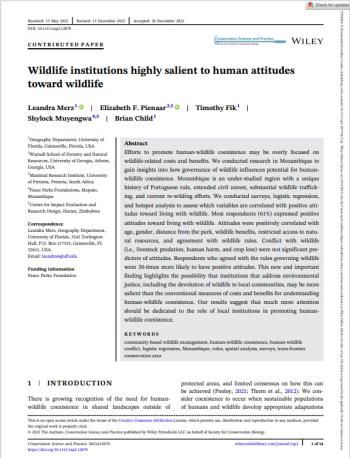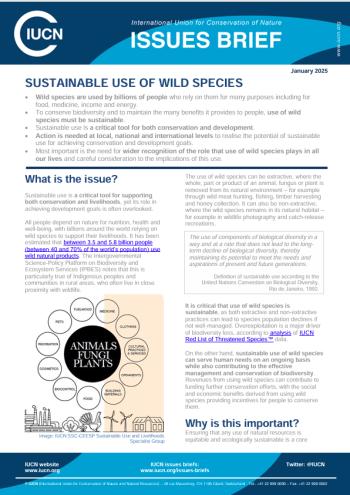
Wildlife institutions highly salient to human attitudes toward wildlife
Efforts to promote human-wildlife coexistence may be overly focused on wildlife-related costs and benefits... Respondents who agreed with the rules governing wildlife were 30-times more likely to have positive attitudes. This new and important finding highlights the possibility that institutions that address environmental justice, including the devolution of wildlife to local communities, may be more salient than the conventional measures of costs and benefits for understanding human-wildlife coexistence. Our results suggest that much more attention should be dedicated to the role of local institutions in promoting human-wildlife coexistence.
Merz, L., Pienaar, E. F., Fik, T., Muyengwa, S., & Child, B. (2023). Wildlife institutions highly salient to human attitudes toward wildlife. Conservation Science and Practice, e12879.
https://doi.org/10.1111/csp2.12879
-
Leandra Merz et al
We support the free flow of information. Please share:
Form coming soon
Related Content
-

-

Review of African Social and Economic Development Volume 1
ByIbrahim Bàbátúndé Anobaarrow_forward2024 -

Economic Analysis: Climate Change and Wildlife Utilization on Private Land
ByJackson OtienoEdwin Muchapondwaarrow_forward2015
Get updates by email
Through impactful research, stakeholder engagement, and professional development, AWEI is supporting the wildlife economy across Africa. Please subscribe for occasional updates on our work and forthcoming events.
Sign up for a quarterly dose of AWEI insights
In a complex and changing world, AWEI generates strategic ideas, conducts independent analysis on wildlife economies, and collaborates with global scholar-practitioners to provide training and expertise for biodiversity conservation, climate resilience, and inclusive economic opportunities in Africa.
